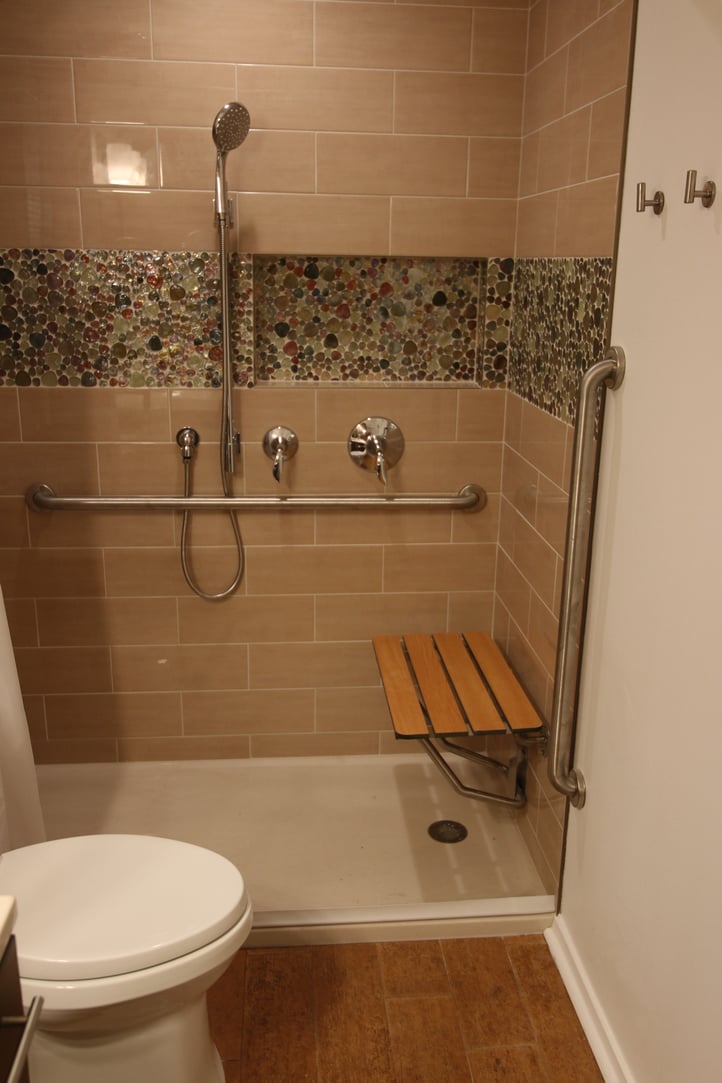Perhaps, you have outgrown the usefulness your existing home once had, because, quite often, it is the home that presents the most significant difficulties in life through the homeowners limited mobility or other physical impairments. As seniors age in their existing living surroundings, their bodies and personal needs are constantly changing. Designing for specific physical conditions will lessen the impact of arthritis, restricted mobility, or loss of vision using combinations of products, concepts, and techniques available today. These Aging in Place changes make your home more adaptable and user-friendly. Home modifications do not need to look institutional; this is why many seniors resist the changes that can help them the most. Moreso, once you decide to sell, the correct modifications increase the value of your home as it appeals to multiple generations of home buyers . The exact scope of work is determined by the CAPS specialist according to your needs.
In some cases, CAPS-certified health workers and therapists, act only as consultants, and are not the ones implementing those suggestions or doing the home modifications. In this case, the actual construction work is assigned to a qualified accessibility contractor. David L. Traut, CAPS, the owner and president of T-Square Company in Austin, Texas, is one of the select group of professionals nationwide to earn the Certified Aging-In-Place Specialist (CAPS) designation, identifying him as a home remodeler and builder with the skills and knowledge necessary to remodel or modify a home to meet the unique needs of the older population, disabled owners, or their visitors. A CAPS-certified remodeler like T-Square Company located in SW Austin is in a great location for helping the people in Dripping Springs and the surrounding area Age in Place. Our company provides a one-stop shop that is even more valuable to anyone wanting to Age in Place. Our construction knowledge and over 27 years of accessibility experience enables any Aging in Place design/build project to come to fruition via practicality and best practices. On the other hand, any additional knowledge gained from a CAPS-certified practitioner or family member is still invaluable for determining the final design.
Complete Aging in Place services and the knowledge of how to carry them out are available to the homeowner through CAPS-certified remodeling. A CAPS specialist considers your current and future circumstances in their design, and the principles focus on elegant, aesthetically enriching barrier-free environments. The first step to increasing your homes accessibility involves scheduling a comprehensive Home Safety Assessment with a CAPS specialist. This requires paying a modest fee for the professional service. The assessment can pay for itself by avoiding the high cost of injury or assisted living, and it provides the homeowner a definite path for the future. Moving forward, the CAPS professional will be additionally compensated for their design and detailed drawings prior to the modification or hard costs. CAPS professionals are generally paid by the hour or receive a flat fee per visit or project. Typically an assessment takes approximately 60-90 minutes. It’s best if you or a family member can accompany the CAPS professional during the home safety assessment. You or they can ask questions about specific safety items as they arise.
Handicap Accessible Bathroom Remodel

During a home assessment for increasing accessibility, the structural needs of the client will be noted and documented through sketches, photos, and conversation. All the surroundings will be considered for the final design, from the flooring to the layout of a specific room or location as it pertains to the inhabitant's ease of usability. The physical and emotional needs of the occupant come into play because of mobility, sensory, or cognitive concerns. The goal is to modify the home in a custom manner to provide for the occupant's maximum health, independence, and safety. Input from any caretakers, like a physical or occupational therapist, during the assessment phase can prove invaluable. The three main rooms involved in Aging in Place home modifications are the bathroom, the kitchen, and the family room, in that order. These areas make up the most occupied spaces of any home and will be connected by a designated accessible route. The basic needs considered involve access through wider doorways, non-slip floor surfaces, widening hallways, installing stairlifts, and good cabinet and plumbing fixture accessibility. You might also consider lowering light switches and thermostats and installing easier-to-use door levers. Safety is of paramount importance to the final accessible design.
Be advised, the vast majority of builders and remodelers do not have the knowledge and training from obtaining the CAPS designation to perform home modifications for Aging in Place. When considering installing a grab bar which seems like a simple endeavor, a run-of-the-mill contractor or handyman has no idea of the safety regulations involved or the knowledge of where to install the grab bar leaving the unaware and trusting consumer in a dangerous situation. The CAPS designation is taught through the National Association of Home Builders in collaboration with AARP. CAPS connects responsible professionals with homeowners who need these services on an ever-increasing basis. CAPS is a nationwide initiative,and all active CAPS professionals can be found at nahb.org/CAPSdirectory.
For more information about T-Square Company, visit www.tsquareco.com or call 512-444-0097.











